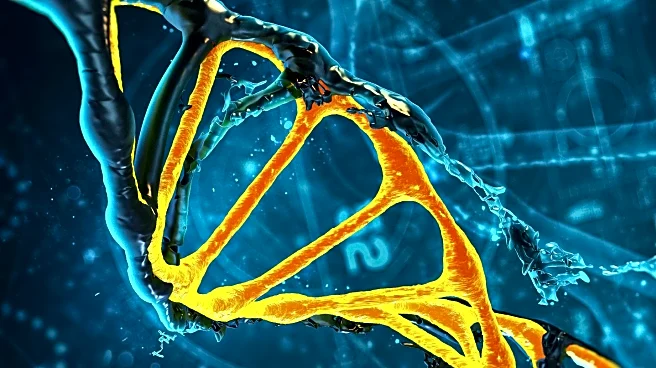What's Happening?
UniQure, a Dutch biotech company, has announced promising three-year data from its gene therapy, AMT-130, for Huntington's disease. The therapy reportedly slowed clinical progression by 75%, maintaining an 80% benefit observed at two years. This development
has sparked excitement and hope among patients and families affected by Huntington's disease, a genetic neurodegenerative disorder. UniQure's shares surged by 248% following the announcement, and the therapy was hailed as a potential breakthrough in treating Huntington's disease. However, experts like Ignacio Munoz-Sanjuan have urged caution, warning against unrealistic expectations at this stage of clinical development. The therapy involves injecting AMT-130 into the brain, which poses significant surgical risks and requires careful patient selection.
Why It's Important?
The announcement of AMT-130's success is significant for the Huntington's disease community, which has faced numerous setbacks in drug development. The potential to slow disease progression offers hope for improved quality of life and independence for patients. If successful, AMT-130 could become the first genetic treatment for Huntington's disease, marking a major milestone in neurodegenerative disease therapy. However, the therapy's invasive nature and the need for intracranial surgery highlight the challenges in its widespread application. The development also impacts other companies in the field, such as Wave Life Sciences, which is pursuing less invasive treatments. The broader implications include increased interest in clinical trials and potential advancements in genetic therapies.
What's Next?
UniQure plans to submit a biologics license application to the FDA in early 2026, with hopes of launching AMT-130 later that year. If approved, it would be the first genetic treatment for Huntington's disease. Meanwhile, Wave Life Sciences is preparing for a Phase II/III study of its own treatment, WVE-003, which aims to slow caudate atrophy as a clinical surrogate endpoint. The success of AMT-130 could influence regulatory pathways and accelerate approval processes for similar therapies. The Huntington's disease community is likely to see increased participation in clinical trials, driven by renewed hope and interest in potential treatments.
Beyond the Headlines
The development of AMT-130 raises ethical considerations regarding patient selection and the risks associated with invasive brain surgery. The therapy's success could shift the focus towards genetic treatments for other neurodegenerative diseases, potentially leading to long-term changes in therapeutic strategies. The excitement surrounding AMT-130 underscores the importance of managing patient expectations and communicating scientific results responsibly. As gene therapies advance, the healthcare industry may face challenges in balancing innovation with safety and accessibility.

















